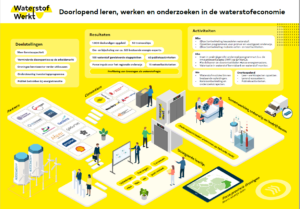
Waterstof Werkt: H2 Train and Learn Hub

In the coming year, Groningen will no longer be one of Europe’s main centres of natural gas. Recognising that this threatens to leave a social gap in the already earthquake-stricken area, a strong movement has emerged in the region to reinvent itself based on its strengths and using the accumulated knowledge and infrastructure from the gas system. The idea, widely supported especially in Groningen and Drenthe, is to play a leading role in the value chain of the new, green gases that will play a central role in our future energy system and as green raw materials in the new circular production processes. Its basic variant, clean hydrogen, is central to this.
To give this concept hands and feet, a lot has already happened in the region, so much so that Europe has declared the region Europe’s first Hydrogen Valley. Not only because of the large scale of the new green gas initiatives, but also because they cover the entire value chain: production, transport, storage and applications in industry, mobility and the built environment. There is now an investment plan until 2030 of more than 50 projects with a combined financial volume of around €10bn.
However, the developments initiated are still fragile, also because the whole hydrogen economy is still in its infancy. Real breakthroughs towards large-scale investment and further roll-out through SMEs and startups are expected in the coming years, but that means the preliminary work needs to be done now. A key component of this is to ensure sufficient skilled personnel for the new technology and applications. This requires knowledge and takes time, but must be done now.
Several initiatives have now emerged within the knowledge sector to respond to this theme in education and research. With the Waterstof Werkt programme (partly made possible by the Groningen National Programme), a start has been made to realise a continuous learning line in the region in the field of hydrogen. With education, training and courses at secondary vocational, college, university and post-initial (advanced professional) level. The relevant educational institutions in the region are working together on a coordinated approach. This is the only way to develop continuous learning lines and achieve synergy between the various educational levels. Cooperation between the business community, civil society organisations, knowledge institutions and governments is crucial for success.
Educational activities will be better, more intensive and, above all, will be mutually aligned with the market needs and investment challenges of companies in the region already during the learning path. It also ensures that, even after the programme ends, education is permanently secured in the region. With the H2 Train and Learn Hub (co-funded by the European Union), the activities in Hydrogen Works are strengthened and broadened, such that a mature plan has now emerged to give the region’s education around the theme the required powerful boost. And thereby guaranteeing the regional availability of several thousand well-educated, additional workers ready to meet the challenges of the hydrogen economy in the region. The current strong knowledge sector in the Northern Netherlands in the field of energy and the energy transition can thus grow into a European authoritative knowledge system in the field of education and applied research in hydrogen.
Facts
Project size: € 10,090,075
Project duration: 2022-2027
Hydrogen Works: Train and Learn Hub receives grant from the National Programme Groningen and the European Union
Project duration: 2022-2027
Partners
ROC Alfa-college, ROC Noorderpoort, Hanzehogeschool Groningen, Drenthe College, NHL Stenden, Rijksuniversiteit Groningen and New Energy Coalition
Co-funders
Techniek Nederland/Wij Techniek, Bouwend Nederland, Afeer, Stork, Shell Nederland, Gemeente Groningen, EBN, GasTerra, Gasunie & NAM.
Deliverables
- A substantial boost for regional education to respond to the emerging knowledge demand for jobs in the sustainable energy sector and the hydrogen economy in particular, as well as further profiling Groningen as a hydrogen region;
- More attention to the energy transition and hydrogen in the entire Groningen education chain (po, vo, mbo, hbo, wo and post-initial), by expanding and adapting the curriculum, and providing learning paths with the business community and other stakeholders;
- Training over 1,000 experts in the hydrogen economy;
- Retraining and upskilling of around 325 existing energy experts and their trainers, partly as an initial contribution to offset job losses due to winding down gas extraction in Groningen;
- Facilitating at least 200 hydrogen-related internships for mbo students, 80 traineeships for hbo students at participating companies and organisations, 100 work-study positions for students in the energy sector as well as 250 students working in the Innovation Workshop at ENTRANCE;
- Strengthened cooperation between Groningen education and industry to achieve a more demand-driven knowledge offering and to strengthen hydrogen investment, applications and acceptance in Groningen; culminating in a “learning community”;
- Building practical research and training activities (secondary vocational, higher vocational, academic and post-initial) to provide regional investments with needed knowledge;
- About 60 public activities and 20 networking activities to increase involvement and support for hydrogen in the region.
Infographic
To explain the project briefly and concisely, an infographic has been created. Click on the image to enlarge the infographic.

